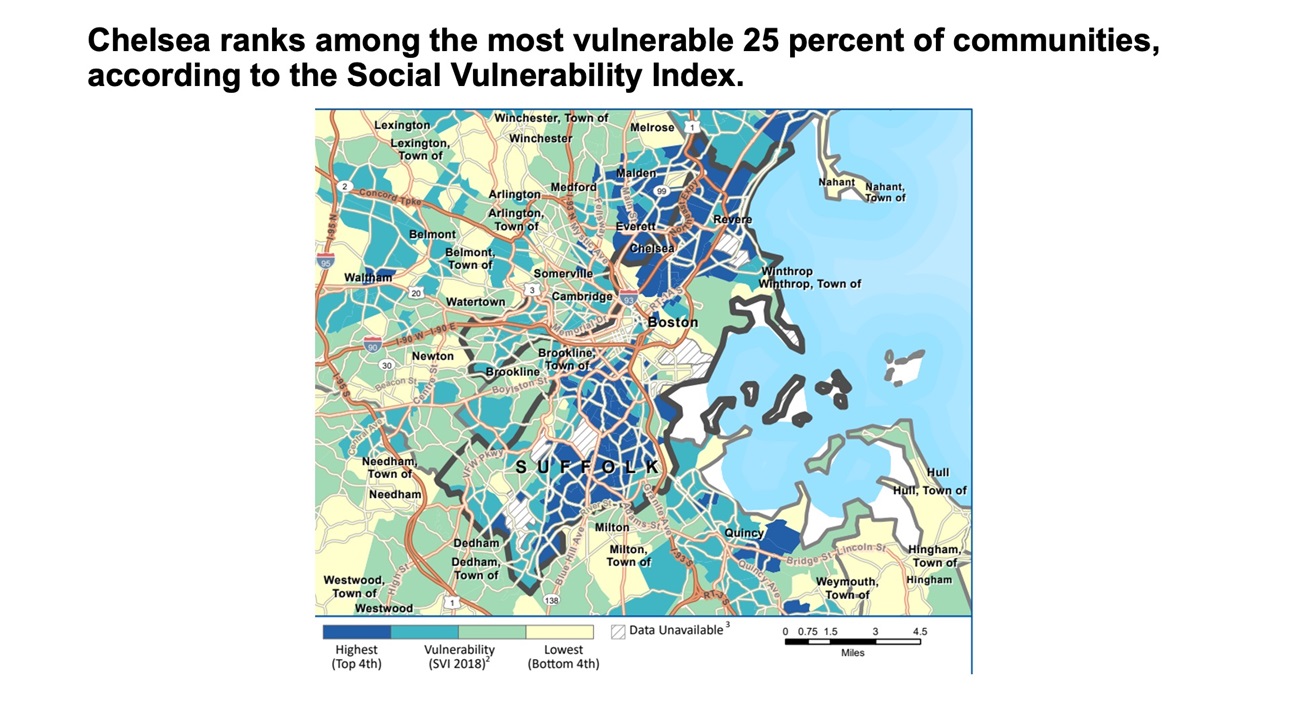Chelsea 2021 and Beyond: Centering a Just and Equitable Recovery through Community Partnership
Recovery for Chelsea is about turning anger into action.
March 16, 2021
On March 16, the Boston kicked off the exploration of a new community-centered initiative that will support the collective strength of a community as it moves through and beyond the pandemic – Chelsea 2021. The event, Chelsea 2021 and Beyond: Toward a Just and Equitable Recovery, brought together data, ideas and anecdotes in a presentation that was informative and emotional, by turns hopeful and angry.
After a welcome from Boston Foundation Chief Philanthropy Office Kate Guedj came an intro from her colleague, Chelsea resident and Assistant Director of Programs Vetto Casado. He shared his lifelong love for his hometown, recalling how as a youngster he had helped out and spent afternoons in his mom’s hairdressing shop.
Boston Indicators Research Manager Trevor Mattos was up next, offering key data points to ground the discussion of where the city stands today. In brief, Chelsea has seen high growth and turnover over recent decades with a shrinking White and a growing Latinx population, the latter now making up 67 percent of residents, with many immigrants, especially from Central America. Chelsea residents today are young (average 33.3 years), less likely than state average to have a college degree, and more likely than elsewhere to hold in low-wage jobs. The high cost of living so close to Boston means over half of Chelsea households spend more than 30 percent of their income on housing. High housing costs have also led to more crowded housing, which coupled with the “essential” nature of many Chelsea residents’ work, despite low wages and limited benefits to make Chelsea’s COVID positivity and death rates among the highest in the state. Federal relief has been critical, especially rental assistance and moratoria on evictions. But it hasn’t solved the basic problems; as Mattos said, “We need partnerships to fill the gaps and empower people in Chelsea.”
A discussion led by Boston Globe columnist Marcela Garcia engaged the panel of community leaders in considering how to do that, given Chelsea’s needs and challenges.
Panelists began by sharing challenges related to their area of work, each weighty in its own right—support needed for small businesses, learning loss and mental health crisis for students (and parents), food insecurity, poor access to health care plus all the deferred care from the past year… the list is long but La Colaborativa’s Gladys Vega brought the crowd up short with her direct, personal and tearful exhaustion with all of it. Between scrambling to find transitional housing for this family, helping that family find food, seeing schoolkids having to go to MacDonald’s for wifi, and running day and night to connect people to the wraparound supports they need, she said, she feels broken. The final straw was the distribution of federal aid from the American Rescue Act, whose flawed formula gave Chelsea only $11 million in relief, while smaller Gloucester was due to receive $23 million and wealthier Newton $65 million. “I feel used and betrayed,” Vega said.
No one differed. Acknowledging Vega’s tears, Elsie Tavares, Executive Director of MGH’s Kraft Center for Community Health, said, “It is incredibly painful to see this allocation. And to see 50 percent of the hospital’s COVID patients having Latinx surnames. We need to look for partnerships that get us out of silos” and leverage the strong social fabric of the community to bring attention to its need. Some allocations are in part population based (highlighting the importance of the census) and while Chelsea’s official population is something around 40,000, many believe the real number of residents to be higher. Panelists shared ideas for how to lobby for further support outside the rigidly allocated federal monies, from lobbying wealthier towns to share their funding to advocating for priority vaccination for the whole city.
In the anger and momentary despair there was energy and clear evidence of paths to unite in strength—the very hope of the Chelsea 2021 initiative.
In closing remarks, Chelsea City Manager Thomas Ambrosino said, “I share Gladys’s outrage. This was a bill intended entirely to help communities disproportionately impacted. Chelsea may be among tops in the nation. This will need advocacy at the state level. The medical piece will be fixed; the virus may be under control by September. What will linger are its economic impact, food insecurity, housing instability—not problems that should exist in the United States—and they are going to take real sustained effort.”
Welcome
Kate Guedj, Senior Vice President and Chief Philanthropic Officer, The Boston Foundation
Introduction to Data
Vetto Casado, Assistant Director, Programs, The Boston Foundation
Chelsea Overview and Data Presentation
Trevor Mattos, Research Manager, Boston Indicators
Panel Discussion and Q&A
Alberto Calvo, Founder, Stop and Compare Markets
Marcela Garcia, Columnist, The Boston Globe (Moderator)
Kelly Garcia-Mirza, Chairwoman, Chelsea School Committee
Yahya Noor, Community Advocate and Owner, Tawakal Cafe
Elsie Taveras, MD, MPH, Executive Director, Kraft Center for Community Health - MGH
Gladys Vega, Executive Director, OneChelsea / La Colaborativa
Responding Comments
Thomas G. Ambrosino, City Manager, City of Chelsea

